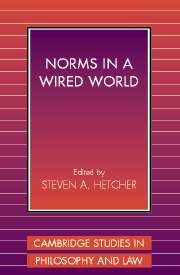Book contents
- Frontmatter
- Contents
- Acknowledgments
- Introduction
- PART I THE PATTERN CONCEPTION OF NORMS
- PART II NEGLIGENT NORMS
- 6 The Traditional Rule of Custom
- 7 The Evidentiary Rule of Custom
- 8 A World of Dangerous Norms and Customs
- 9 Regulating the Rule of Custom to Create Safe Social Norms
- 10 Juror Norms and the Reasonable Person Standard
- 11 Rejection of the Dominant Paradigm of Negligence
- PART III CYBERSPACE PRIVACY NORMS
- Conclusion
- Notes
- Index
11 - Rejection of the Dominant Paradigm of Negligence
Published online by Cambridge University Press: 05 June 2012
- Frontmatter
- Contents
- Acknowledgments
- Introduction
- PART I THE PATTERN CONCEPTION OF NORMS
- PART II NEGLIGENT NORMS
- 6 The Traditional Rule of Custom
- 7 The Evidentiary Rule of Custom
- 8 A World of Dangerous Norms and Customs
- 9 Regulating the Rule of Custom to Create Safe Social Norms
- 10 Juror Norms and the Reasonable Person Standard
- 11 Rejection of the Dominant Paradigm of Negligence
- PART III CYBERSPACE PRIVACY NORMS
- Conclusion
- Notes
- Index
Summary
Cases come to the courts through formal pleadings cut to some pattern or patterns of legal theory. Evidential data are offered to support these and the opposing theories. There is no suggestion that the tenor of the Restatement is designed for these purposes. After the evidence is heard, the theories insisted upon by the parties through their lawyers are translated to the jury by instructions in terms of formulas. Certainly the black letter statements are not intended to supplant the formulas already worked out and utilized by the courts in tort cases. These are too ponderous and elaborate for such a purpose. Assuming that a judge would know which ones to give, no jury would comprehend them.
Leon GreenIntroduction
In this chapter, I will argue at length that a failure to properly characterize the jury norm effect leads the Third Restatement account of negligence astray. Apparently due to the bias of legal centralism, the Third Restatement assumes, without little by way of argument or evidence, the dominant causal efficacy of the Hand Test interpretation of the reasonable person standard on the deliberations of juries, and hence on the outcomes in negligence suits.
Based on the empirical support and analysis presented in Chapter Ten, I will argue to the contrary that there is good reason to suppose that juries do not engage in Hand Test normative processing but instead draw from their diverse array of everyday norms and customs when providing concrete substance to the abstract reasonable person standard in order to come to a decision on the issue of negligence.
- Type
- Chapter
- Information
- Norms in a Wired World , pp. 226 - 240Publisher: Cambridge University PressPrint publication year: 2004

